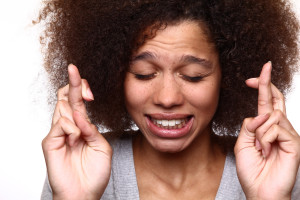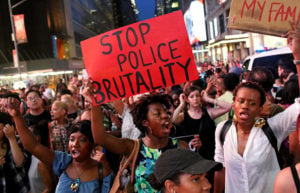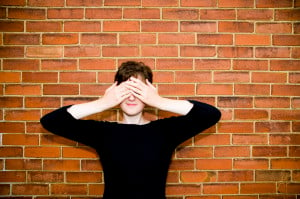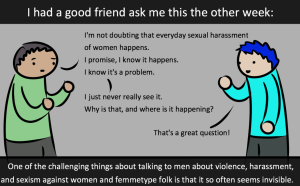Imagine your very own meet-cute: You’re at your favorite coffee shop when you and a stranger both reach for the same cup of coffee. The stranger lets you take the cup, and her act of generosity prompts a conversation between the two of you.
You start running into her at the coffee shop every day, and your conversations get longer and longer. You’ve always thought that you might be attracted to women, but the chemistry that you have with her confirms it.
You’re nervous about asking her on a date, but one day you just blurt it out. A look of surprised delight crosses her face and, beaming, she says yes. You’re giddy with excitement, but there’s just one problem: You’ve never dated another woman before.
It’s understandably nerve wracking, because you have little idea of what a relationship between two women should look like.
That’s because our expectations for relationships are shaped by heteronormativity and patriarchy, or the idea that a relationship requires complementary “masculine” and “feminine” roles.
Men and masculine-identified people are supposed to be assertive, while women and feminine-identified people are supposed to be passive – and non-binary people are rarely acknowledged at all.
That’s why most people are brought up with the idea that, unless it’s a Sadie Hawkins dance, men are supposed to ask women out. Anything else is out of the norm.
Heteronormativity is so pervasive an idea that people try to impose it even on queer couples. It’s easy for queer couples to get caught up in these heteronormative expectations as well.
If you’re a woman who’s dating another woman for the first time, you might ask yourself who will plan the outing. Who will pick who up? Who will pay for meals? In short, who should be “in charge” of the relationship?
But when you’re queer, you shouldn’t have to try and squash your relationship into the narrow confines that straight people have dictated for you.
As clueless as you might feel, though, there’s some good news: You don’t have to prescribe to heteronormative relationship roles. Nobody has to, in fact, and it would make for healthier relationships all around if both people were equally in charge.
See, being queer isn’t just about dating someone of the same gender. It’s about queering expectations for relationships.
In other words, it’s about breaking down heteronormativity and building up relationships that are based on communication, negotiation, and a level playing field.
I know that sounds like a tall order, especially if you haven’t even gone on your first date yet, much less know what you’re going to do.
You’re going to need some tips, and luckily enough, that’s exactly what I’m here to provide.
With any luck, these tips will help you establish communication, negotiation, and a level playing field so that you can have a good time on your first date.
1. Safety
One of the first things to consider when planning a date with another woman is safety. In a perfect world, you wouldn’t have to worry about this. Unfortunately, we don’t live in a perfect world.
So while planning your date, you should make sure that whatever you’re doing won’t endanger your or your date’s personal safety.
Personal safety encompasses both physical safety and levels of comfort. In terms of physical safety, there are a few questions you should keep in mind:
- Do you have a reliable mode of transportation to and from the location?
- Do any of your friends or family know where you’re going, and when to expect you back?
- Will you be home before dark? If you’re not, will there be a lot of people at the location you’re going, or will it be more isolated?
In terms of personal comfort, you and your date should discuss how you feel about PDA.
It’s not just about whether you and your date are out. It’s also a matter of how comfortable someone is with physical intimacy, especially on a first date. Consent is necessary, even in minor matters of physical intimacy.
And lastly, like it or not, PDA between queer couples will attract attention: some seemingly positive, some negative, and some downright scary.
That’s why you and your date should ask each other whether or not you’re comfortable with PDA. If one of you isn’t, then the other must respect that.
If both of you are, then discuss what sort of PDA is okay. For example, someone might be comfortable with holding hands, but not with kissing.
Remember: Even if you both consent to PDA, you can withdraw that consent at any time. If you feel uncomfortable or unsafe while on your date, it’s okay to tell your partner that you don’t want to hold hands or kiss anymore and vice versa.
A date should be fun, and it won’t be unless your personal comfort is respected.
2. Planning the Date
Planning the date is where you can start chipping away at heteronormativity. Instead of waiting for your date to make the decisions or taking over them yourself, make sure that both of you have an equal hand in planning the date.
Figure out what you want to do together. You can use this opportunity to get to know your date better!
You can even turn it into a fun game, like filling out a getting-to-know-you bingo card that includes information about restaurants you’ve always wanted to try, favorite movies, and locations you like to visit.
Getting to know someone is one of the most enjoyable aspects of any relationship, so it’s never too early to start.
If you want your date to surprise you or vice versa, just make sure that they know that. Fill out that bingo card, or write a short essay about what an ideal date would look like — and then use that information to plan the perfect surprise.
3. What to Wear
Straight people get some weird ideas about what queer women should dress like. But you’re not here to fulfill straight people’s expectations (or other queer people’s, for that matter), so don’t worry about whether you’re dressing “queer” enough. There’s no such thing.
You’re going on a date, so if you want to look cute, that’s okay. Just remember that what’s “cute” is up to you.
Makeup isn’t bad, and neither are dresses or skirts. But neither is no makeup bad, or jeans or T-shirts. Wear whatever makes you feel good. And if your date appreciates it, then they’re probably a keeper.
4. How Do I Get Closer to My Date?
If you and your partner agreed on no PDA, it might be hard to feel like you’re on a date. However, there are other ways to feel intimate and connected to your partner. You can try doing these things even if you did decide on PDA:
- Say something nice to your date when you see her. It doesn’t have to be a compliment. It can be something as simple as “I’m happy to see you.” Let your date know how you feel!
- Put your cell phone away. It’s easy to get distracted by texts or social media, especially if you’re nervous and looking for something to do with your hands. However, nothing is more off-putting than a date who seems more interested in their screen than you. Focus your attention on your partner instead.
- Ask each other more questions about yourselves. You don’t have to stick to the stock ones about favorite movies or colors either. You can try some of these uncommon questions. Or, if you’re feeling brave, you can try the 36 questions that lead to love.
The point of a date is to get to know someone better. Just remember that, and be honest with your date and yourself.
5. Who Pays?
It doesn’t matter. Seriously.
There shouldn’t be any expectations about who pays. Since you’re both equal partners in the relationship, you and your date can negotiate how you want to take care of the bill.
You can split it, or one of you can pay this time and the other the next time – which is, by the way, a smooth and excellent way to let your date know that you want to see them again.
6. The Date Is Almost Over – Now What?
Maybe you agreed that kissing is okay, but you haven’t gotten up the courage to actually do it. Maybe you didn’t want to kiss while on the date, but now that you’re saying goodbye, you’ve changed your mind.
Or maybe you want to do more than kiss. That’s totally okay! Why wait for the third date when you’re a fully informed, consenting adult who knows what she wants?
The crucial thing, whether you want to kiss or have sex or even hold hands, is communication and consent. You don’t have to passively wait for someone to kiss you, but neither should you just land one on your partner without warning.
Instead, just ask her what she wants to do. Whatever decision the two of you arrive at together, you should both respect it.
It might be kind of embarrassing at first to talk frankly about things like kissing and sex, but trust me: it makes things much easier in the long run.
7. What If I Want to See Her Again Or Get Serious?
When my partner and I started dating, we didn’t know where we wanted to take the relationship. Instead of just asking each other, we skirted around the topic and spent a lot of time being confused on our own.
We did this until my partner began referring to me as her girlfriend in our conversations. She later told me that, at the time, it totally seemed like a smooth way to ask about the status of our relationship.
Luckily, I did want to be girlfriends. But it could have easily led to discomfort and misunderstandings if I didn’t want that.
It would have been much simpler if my partner and I had just asked each other the question: Do you want to be my girlfriend?
What I’m trying to say is, if you really like your date and want to deepen the relationship, take the plunge and just ask. It’s kind of scary. But love is, after all, about taking some chances.
***
There it is! Hopefully these dating tips will help you get through your first date without having to fall back on those heteronormative ideals.
I know that there are probably a hundred other questions that haven’t been answered, and a hundred other questions that will come up as you go on your first date.
That’s why I’m going to list a couple of other resources you can use as you prepare for your first date (or relationship) with another woman. These resources don’t just cover relationship advice, but also discussions on gender, sexuality, and race, to name a few (because we all know that intersectionality is important).
- Autostraddle features not only relationship and sex advice for queer women but also DIY projects and TV show recaps.
- Black Girl Dangerous features the voices of queer people of color, whether it’s about relationships or anti-racist work. They even have a web series featuring a QPOC protagonist!
- AfterEllen has a focus on pop culture, but also has sections for dating advice.
- Finally, you can also look to fictional queer women as a model for your own relationships. I’m not saying that you should do everything they do. You should consume media (just like everything else) with a critical lens.
But it’s affirming to see queer characters in the media, especially complex and well-rounded ones. Here’s a Buzzfeed list of web series featuring lesbian protagonists, and a list on Racialicious featuring queer protagonists.
As far as books go, Goodreads is your friend. They have multiple lists curated by readers, and many of those lists feature books about queer women protagonists.
These resources will help guide you as you navigate the first uncertain steps towards crafting a strong, meaningful relationship.
But here’s the most important tip of all, the one that you should always keep in mind: Healthy relationships are built on communication, negotiation, and making sure that both partners are equal in making decisions.
It’s true whether you’re in a queer relationship or not. And as long as you make sure those three things are happening when you go on your first date, you’ll be fine. Trust me.
[do_widget id=”text-101″]
Kerry Truong is a Contributing Writer for Everyday Feminism. They are a queer diasporic Vietnamese womxn and graduated this spring with a double degree in English and Asian American Studies. When they’re not philosophizing about this at length, they’re reading, taking long walks, or cooing over all the dogs who cross their path. Read their Everyday Feminism articles here.
Search our 3000+ articles!
Read our articles about:
Our online racial justice training
Used by hundreds of universities, non-profits, and businesses.
Click to learn more





















